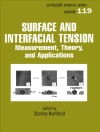ELECTROCERAMICS FOR HIGH PERFORMANCE SUPERCAPACITORS
The book describes the state-of-the-art analyses of high-density supercapacitors.
In the near future, high-energy density materials will be required to accommodate the increased demand for gadgets, hybrid cars, and massive electrical energy storage systems. Fuel cells, supercapacitors, and batteries have the highest energy densities, but traditional capacitors have gained attention for intermittent energy harvesting owing to their high energy transfer rate and quick charging/discharging capability. The large amount of electric breakdown strength and modest remnant polarization are keys to the high energy density in dielectric capacitors. Above 100??C or 212??F, polymer dielectric capacitors become unstable and begin to suffer a dielectric breakdown. Hence, dielectric ceramics are the sole viable option for high-temperature applications.
This book provides a basic understanding of dielectric-based energy harvesting. After a detailed analysis of the state-of-the-art, it proceeds to explain the specific strategies to enhance energy storage features, including managing the local structure and phases assembly, raising the dielectric width, and enhancing microstructure and electrical uniformity. Also discussed is the need for novel materials with applications in high-density supercapacitors.
Audience
The book is designed for engineers, industrialists, physicists, scientists, and researchers who work on the applications of high-density supercapacitors.
Circa l’autore
Inamuddin, Ph D, is an assistant professor at King Abdulaziz University, Jeddah, Saudi Arabia and is also an assistant professor in the Department of Applied Chemistry, Aligarh Muslim University, Aligarh, India. He has extensive research experience in the multidisciplinary fields of analytical chemistry, materials chemistry, electrochemistry, renewable energy and environmental science. He has published about 190 research articles in various international scientific journals, 18 book chapters, and 60 edited books with multiple well-known publishers.
Tariq Altalhi, Ph D, is Head of the Department of Chemistry and Vice Dean of Science College at Taif University, Saudi Arabia. He received his Ph D from the University of Adelaide, Australia in 2014. His research interests include developing advanced chemistry-based solutions for solid and liquid municipal waste management; converting plastic bags to carbon nanotubes and fly ash to efficient adsorbent material. He also researches natural extracts and their application in the generation of value-added products such as nanomaterials.
Sayed Mohammed Adnan, Ph D, works in the Department of Chemical Engineering, Zakir Husain College of Engineering and Technology, Faculty of Engineering and Technology, Aligarh Muslim University, India. He is currently developing prototype devices and coin cells for electric vehicles (EVs) and portable devices in collaboration with industries for advanced chemical cells.












